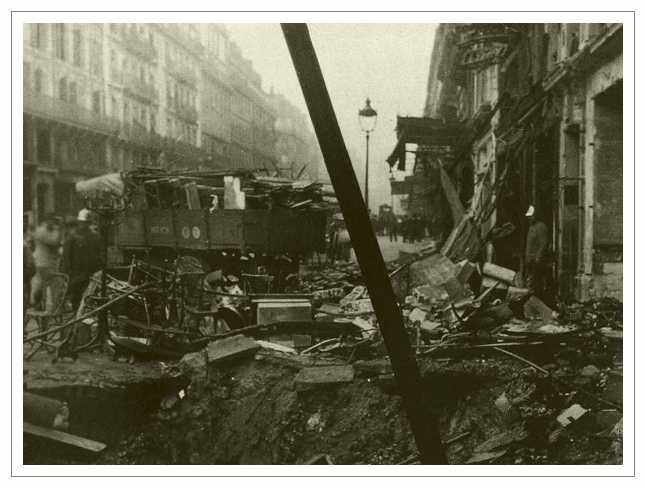'a Personal Description'
- from the book : ‘The Peak of the Load’
- by Mildred Aldrich
March 28th, 1918
On Saturday morning, the third day of the battle, — at about half-past seven — as I was sitting in the garden listening to the guns, I heard an explosion in the direction of Paris, and, while I was wondering what it could mean, the church bells all along the valley began to ring out an alerte. I had not heard a sound even resembling a moteur in the air and the sound from Paris was not in the least like that made familiar by the air raids. Besides, the Germans have never attempted an air raid by daylight, although the English have. It could not have been more than a half hour later that there was another sound exactly like the first in the same direction. But this time there was no alerte, and there was no noise of the guns for the defence of the city against avions. At regular intervals all day, while we read the trying news from the front, — eighty divisions of German soldiers thrown against the British — we heard that sound from Paris repeated.
About half-past four in the afternoon Amélie's nephew, a lad of sixteen, who works in an ammunition place, arrived from Paris — his train over an hour and a half late — with the news that Paris was being bombarded from the air—that the attack began a little after seven — that there had been no alerte until after the bombardment began, and, that up to the time he left, no German avions had been heard by the listening posts anywhere, and yet once in about fifteen minutes a bomb fell.
That was all very mysterious.
I asked him if much damage had been done, and if there was any panic.
He said he had heard that several people had been killed, but there was no panic. When the sirènes went through the streets after the first bomb, people ran, as usual, for the abris, but as silence followed they gradually came out into the streets, and stood about, gazing up into the air. No sign of any air machine — any Boche — had been seen. When the lad left Paris there was a spirit of curiosity rather than alarm, and the only harm he had actually seen was a newspaper kiosk, near the railway station, destroyed, and a hole in the ground. That looked serious enough, considering the situation. But "a miss is as good as a mile."
The next day, Sunday — a day too beautiful to look on such horrid deeds — we got the explanation. It seemed inconceivable, but it is evidently true. The latest war exploit of the Huns is a gun set up — so the aviators say — somewhere near La Fère, where the Yorkshire boys fought their last battle before retreating here in September, 1914, — a gun which is bombarding Paris at a distance variously stated at from sixty-five to eighty miles, — either distance seems equally incredible, but it is evidently true. The military authorities are said to have it placed. The question is to destroy it. But you probably heard all about this by cable.
The son of one of my neighbours who is at home on leave — he is an aviator to-day; he was a farmer in 1914, — said, as we were listening to this gun yesterday, for it is still at work:
"Madame, this is war. If we want to win, we have got to get rid of all our civilian ideas. If nations do not want to put up with things of this sort, why they must find another way than war to settle their disputes. No one would be in the least sentimental about killing a tiger and its whelps. Why pretend to a finer feeling about an enemy more dangerous than a tiger—an enemy so dangerous that even when we get him down — and we shall — I don't see how the world can go on unless we exterminate him, even if it takes this generation. If we, stupidly, do not, then we must suffer for it later. Be sure of one thing, if the Boches get us down, they'll wipe us out. The whole earth is not big enough for both of us."
Anyway, there is a point of view for you.
...
Last night we heard no guns. This morning's communiqué announced that the German advance has been practically stopped — at all events the Allies are holding them — the breaches in the line have been filled — it is unbroken.
Photos of Big Bertha
Big Bertha firing at Paris
Damage caused by a shell fired by Big Bertha
- Not Big Bertha herself, but a long range railway gun captured by Canadian troops
- and displayed to the public in Paris.




